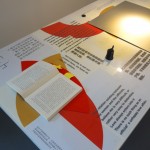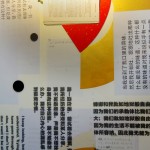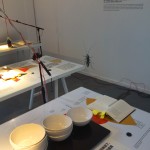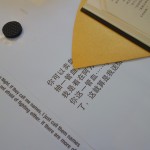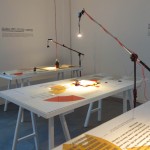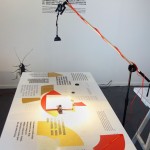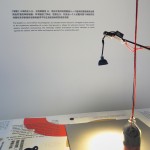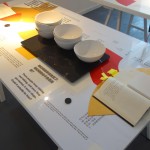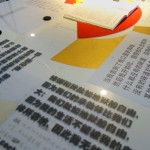Three Novels Dissected, an installation reflecting on The Castle by Franz Kafka, The Passion According to G.H. by Clarice Lispector and The Chronicle of a Blood Merchant by Yu Hua, various media, various sizes, 2015. The work was created for the exhibition “Assured Stability” curated by Li Xiaofei at V Art Center in Shanghai, 2015.
Human societies are conservative in their nature and strive towards stability. To make an oversimplification, we can say that society’s collective “desire” is that things should stay the same. Sometimes individuals find themselves at odds with these collective principles and are forced to fight against accepted values. The installation looks at three very different novels that describe people or families in situations where they have to fight the social norms.
Chronicle of a Blood Merchant is a novel that tells the story of a man, Xu Sanguan, who sells his blood throughout his life attempting to improve the situation for himself and his family during times of great political unrest. It is revealed that his oldest and favourite son was conceived by a neighbour and not by him. Throughout his existence he has to fight for the love he still feels for the son and for the deep respect he still feels for his wife.
The Castle is a novel where its protagonist, an outsider known only as K., struggles to gain access to the mysterious authorities of a castle that govern a village for unknown reasons. The Castle depicts alienation, bureaucracy, the seemingly endless frustrations of man’s attempts to stand against the system, and the futile and hopeless pursuit of an unobtainable goal.
The Passion According to G.H. is a novel that takes the form of a monologue by a woman, identified only as G.H., a well-to-do resident of a Rio de Janeiro penthouse. She reflects on what had happened to her the previous day, when she decided to clean out the room that has been occupied by the maid, who had just quit. She crushed a cockroach in the door of a wardrobe, studies the creature in great detail and eventually eats its squashed flesh.
What originally interested me in the novels was the human fascination for conflict, imbalance and drama. This fascination forms the foundation for much art and maybe literature in particular. It forms an interesting counter weight to the exhibition’s theme that focuses on modern society’s aspiration for stability and which implications these have for our lives. Each of the novels’ protagonists is forced by outside events to test the boundaries of their reality and to solve problems that they are faced with as the stability of their normal lives are pushed into a whirlwind of events. The pragmatic issues of survival of Xu Sanguan are virtually opposed to the metaphysical questions of the wealthy G.H. – and still, their trajectories of self-discovery and development of problem-solving strategies show clear parallels.

